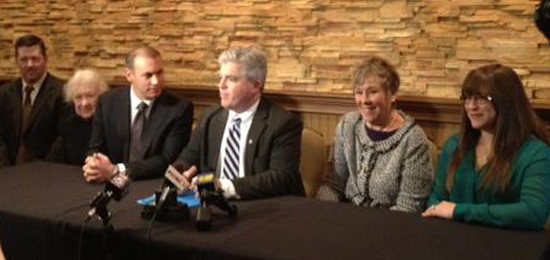
Press conference for the signing of the Safer Sales Slip Act. Photo courtesy: Elisabeth Fiteni.
Long Island’s Suffolk County legislature is once again leading the nation in efforts to reduce its residents’ exposure to a chemical called bisphenol A (BPA), repeatedly linked with increased risk of breast cancer and other health problems. In December, county legislators voted to ban the use of BPA-coated receipt paper, used in retail stores, ATMs, and gas stations across the country.
The Maurer Foundation calls Suffolk County home, and we are so pleased to see local government putting its citizens’ health at such a high priority. We also agree with opponents of the bill that more research should be conducted. However, as we’ve discussed previously, existing studies of the ability of BPA — a synthetic estrogen — to leach into food and be absorbed through the skin certainly warrants concern as well as the application of our “Better Safe Than Sorry” ruling on potential breast cancer risks.
This Safer Sales Slip Act comes less than four years after Suffolk County enacted the first ban in the country on BPA-laced baby bottles and sippy cups used by children under three. After the local government enacted this ban, many other states and counties across the nation followed suit. The new law targets thermal receipt papers coated with BPA, and lawmakers are quick to note that BPA-free alternatives are readily available.
Over the decades, we have learned that many everyday substances originally thought to be harmless are actually carcinogens. And there are still many more substances we encounter every day that require more research, like parabens frequently used in makeup and deodorants. Time and further study will tell whether BPA joins the ranks of cigarette smoking and even alcohol as substances that are certain to increase health risks.
In the meantime, though, we are happy to see this kind of proactive safeguard being implemented right in our own backyard. What do you think? Would you like to see a similar ban in your hometown. Have you ever thought about receipts as a health risk before?